By Leen Randell
Updated: Jul 03, 2024
10 Best Herbal Teas For Peptic Ulcers
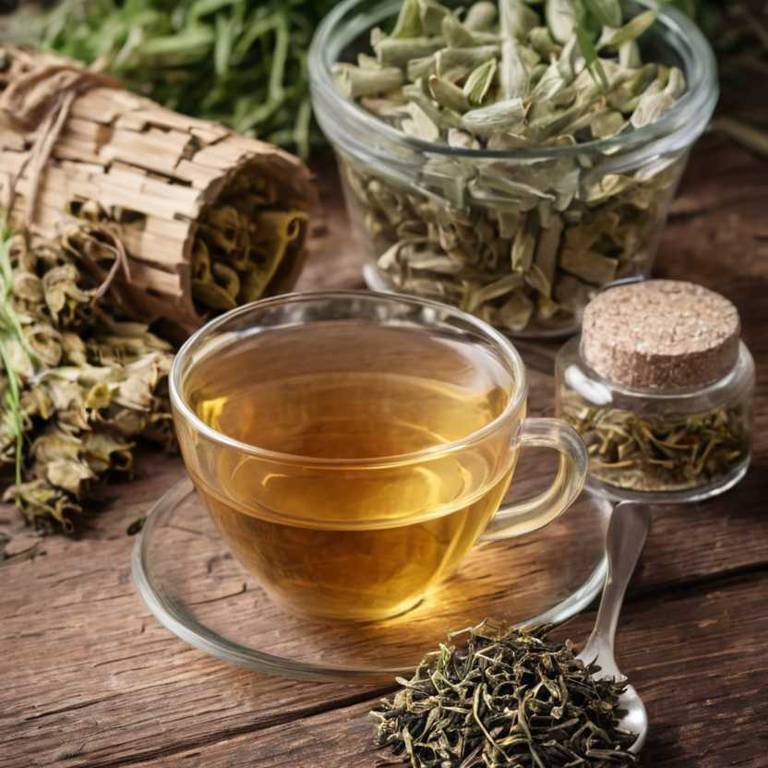
Herbal teas for peptic ulcers are a natural remedy that helps alleviate symptoms and promote healing of the stomach lining.
Peptic ulcers occur when the stomach lining is compromised, leading to painful sores. Herbal teas such as peppermint, chamomile, and licorice root have anti-inflammatory properties that soothe the digestive tract.
These teas help reduce inflammation, ease pain, and improve digestion, allowing individuals to enjoy meals and activities without discomfort, significantly improving their quality of life.
The following article describes in detail the most important teas for peptic ulcers, including medicinal properties, parts of herbs to use, and recipes for preparations.
- 1. Glycyrrhiza glabra
- 2. Matricaria chamomilla
- 3. Zingiber officinale
- 4. Helichrysum italicum
- 5. Hypericum perforatum
- 6. Althaea officinalis
- 7. Taraxacum officinale
- 8. Symphytum officinale
- 9. Plantago major
- 10. Foeniculum vulgare
- What is the best combination of herbal teas to use for peptic ulcers?
- What ailments similar to peptic ulcers are treated with herbal teas?
1. Glycyrrhiza glabra
Glycyrrhiza glabra, also known as licorice, teas helps with peptic ulcers because of its anti-inflammatory properties and soothing effects on the stomach lining.
The flavonoids and saponins present in licorice root tea help to reduce inflammation and promote the healing of damaged tissues. Additionally, licorice tea's ability to inhibit the production of stomach acid can help to alleviate symptoms of peptic ulcers, such as heartburn and abdominal pain.
This makes licorice tea a popular natural remedy for promoting digestive health.

Medicinal Constituents
The list below shows the primary medicinal constituents in Glycyrrhiza glabra teas that help with peptic ulcers.
- Glycyrrhizin: A triterpenoid saponin that helps to reduce inflammation and protect the mucous membranes in the stomach, thus preventing further damage to the lining and promoting healing of peptic ulcers.
- Liquiritin: A phenolic compound that has anti-inflammatory and antioxidant properties, which help to soothe and protect the stomach lining, reducing the risk of peptic ulcers and promoting the healing process.
- Licoricidin: A flavonoid glycoside that has anti-inflammatory and antimicrobial properties, which help to reduce inflammation and prevent the growth of bacteria that can contribute to the development of peptic ulcers.
Parts Used
The list below shows the primary parts of licorice used to make teas for peptic ulcers.
- Roots: The roots of Glycyrrhiza glabra are used to make teas for peptic ulcers because they contain compounds like glycyrrhizin, which have anti-inflammatory and mucilaginous properties that help soothe and protect the stomach lining.
- Leaves: The leaves of Glycyrrhiza glabra are used to make teas for peptic ulcers because they are rich in flavonoids and phenolic acids, which have antioxidant properties that help reduce inflammation and promote healing.
- Flowers: The flowers of Glycyrrhiza glabra are used to make teas for peptic ulcers because they contain flavonoids and phenolic acids, which have anti-inflammatory and antioxidant properties that help soothe and protect the stomach lining.
Quick Recipe
The following recipe gives a procedure to make a basic licorice for peptic ulcers.
- Harvest 20-30 grams of dried glycyrrhiza glabra roots with a sharp knife.
- Crush 5-7 grams of the dried roots into a fine powder using a mortar.
- Steep 2 teaspoons of the powder in 1 liter of boiling water for 10 minutes.
- Strain the mixture through a cheesecloth or a fine-mesh sieve into a clean container.
- Discard the solids and let the liquid tea cool to a comfortable drinking temperature within 30 minutes.
2. Matricaria chamomilla
Matricaria chamomilla, also known as chamomile, teas helps with peptic ulcers because of its anti-inflammatory and soothing properties.
The tea contains apigenin and luteolin, flavonoids that reduce inflammation and pain in the stomach lining, allowing the ulcers to heal faster. Additionally, chamomile's antioxidant properties help to protect the stomach lining from further irritation and damage, promoting a healthy digestive system and reducing the risk of future ulcers.
This natural remedy has been used for centuries to alleviate digestive issues and promote overall well-being.
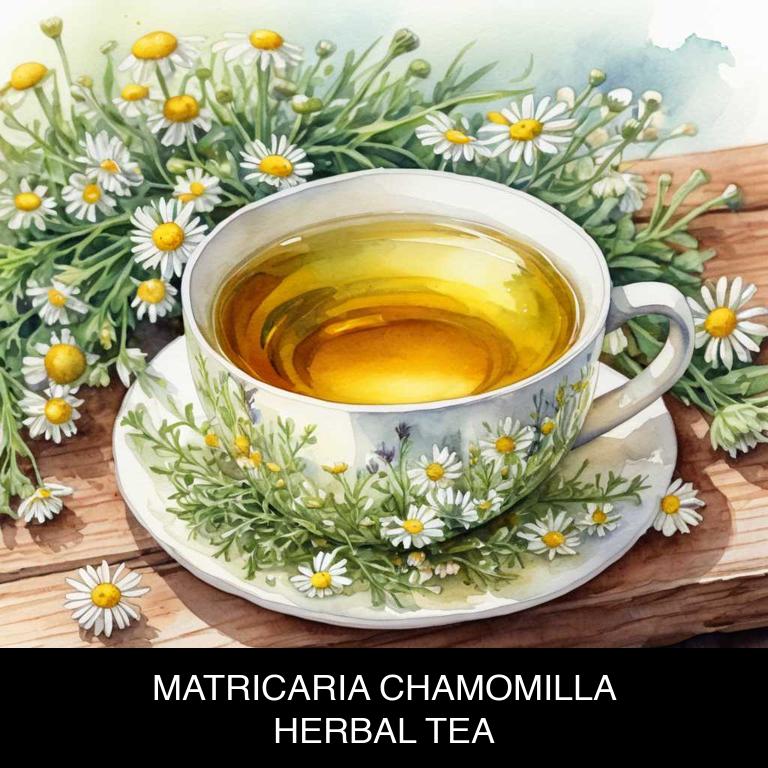
Medicinal Constituents
The list below shows the primary medicinal constituents in Matricaria chamomilla teas that help with peptic ulcers.
- Apigenin: Apigenin is a flavonoid that helps with peptic ulcers by reducing inflammation and soothing the mucous membranes in the stomach, thereby preventing acid reflux and promoting healing.
- Chamazulene: Chamazulene is a sesquiterpene that helps with peptic ulcers by inhibiting the production of stomach acid and reducing inflammation, which helps to protect the stomach lining from further damage.
- Luteolin: Luteolin is a flavonoid that helps with peptic ulcers by reducing inflammation, preventing the production of stomach acid, and promoting the healing of the stomach lining, thereby reducing the risk of complications.
Parts Used
The list below shows the primary parts of chamomile used to make teas for peptic ulcers.
- Flowers: They are used due to their anti-inflammatory and soothing properties that can help alleviate symptoms of peptic ulcers.
- Seeds: They are used due to their carminative and anti-spasmodic properties that can help reduce inflammation and ease digestive issues associated with peptic ulcers.
- Leaves: They are used due to their anti-inflammatory and antioxidant properties that can help protect the stomach lining and reduce inflammation caused by peptic ulcers.
Quick Recipe
The following recipe gives a procedure to make a basic chamomile for peptic ulcers.
- Gather 1 ounce of dried matricaria chamomilla flowers and place them in a clean container for storage.
- Measure 1 teaspoon of dried flowers for every 8 ounces of boiling water and add to a teapot.
- Steep the flowers in boiling water for 5 to 7 minutes or according to the package instructions.
- Strain the tea through a fine-mesh sieve or cheesecloth into a cup to remove the solids.
- Allow the tea to cool slightly before serving and enjoy as a calming herbal remedy.
3. Zingiber officinale
Zingiber officinale, also known as ginger, teas helps with peptic ulcers because of its anti-inflammatory properties that aid in soothing the digestive tract.
The bioactive compounds in ginger, such as gingerol and shogaol, have been shown to reduce inflammation and alleviate symptoms associated with peptic ulcers, including pain and nausea.
Additionally, ginger's ability to improve blood flow and stimulate digestion can help in the healing process of ulcers, making it a potential natural remedy for those suffering from this condition.

Medicinal Constituents
The list below shows the primary medicinal constituents in Zingiber officinale teas that help with peptic ulcers.
- Gingerols: Gingerols have anti-inflammatory and antioxidant properties, which help reduce inflammation and promote healing in the stomach lining, alleviating symptoms of peptic ulcers.
- Shogaols: Shogaols have antimicrobial properties, which help prevent bacterial overgrowth in the stomach, a common cause of peptic ulcers, and reduce the risk of infection and ulcers.
- 6-gingerol: 6-Gingerol has anti-ulcerogenic properties, which help protect the stomach lining from acid damage, reduce acid secretion, and alleviate pain and inflammation associated with peptic ulcers.
Parts Used
The list below shows the primary parts of ginger used to make teas for peptic ulcers.
- Rhyzomes: The rhyzomes of Zingiber officinale are used because they contain compounds like gingerol and shogaol, which have anti-inflammatory and digestive properties that help alleviate peptic ulcer symptoms.
- Roots: The roots of Zingiber officinale are used because they contain a high concentration of gingerols and shogaols, which help reduce inflammation and nausea associated with peptic ulcers.
- Barks: The barks of Zingiber officinale are used because they contain compounds that aid in digestion and help reduce inflammation in the stomach, making them a helpful addition to teas for peptic ulcers.
Quick Recipe
The following recipe gives a procedure to make a basic ginger for peptic ulcers.
- Harvest 1-2 inches of fresh zingiber officinale rhizome roots for maximum potency and flavor.
- Chop the harvested rhizome roots into small pieces to increase the surface area for infusion.
- Combine 1 teaspoon of the chopped rhizome roots with 1 cup of boiling water to create the tea base.
- Allow the tea base to steep for 5-7 minutes to extract the active compounds and flavors.
- Strain the tea through a fine-mesh sieve and discard the solids to produce a clear and flavorful infusion.
4. Helichrysum italicum
Helichrysum italicum, also known as curry plant, teas helps with peptic ulcers because of its anti-inflammatory and antioxidant properties.
The flavonoids and sesquiterpenes present in this herb have been shown to reduce inflammation and promote healing in the digestive tract. By soothing the mucous membranes and reducing acid production, Helichrysum italicum tea may help alleviate symptoms associated with peptic ulcers, such as pain and digestive discomfort.
Regular consumption may also help prevent future ulcers from forming.
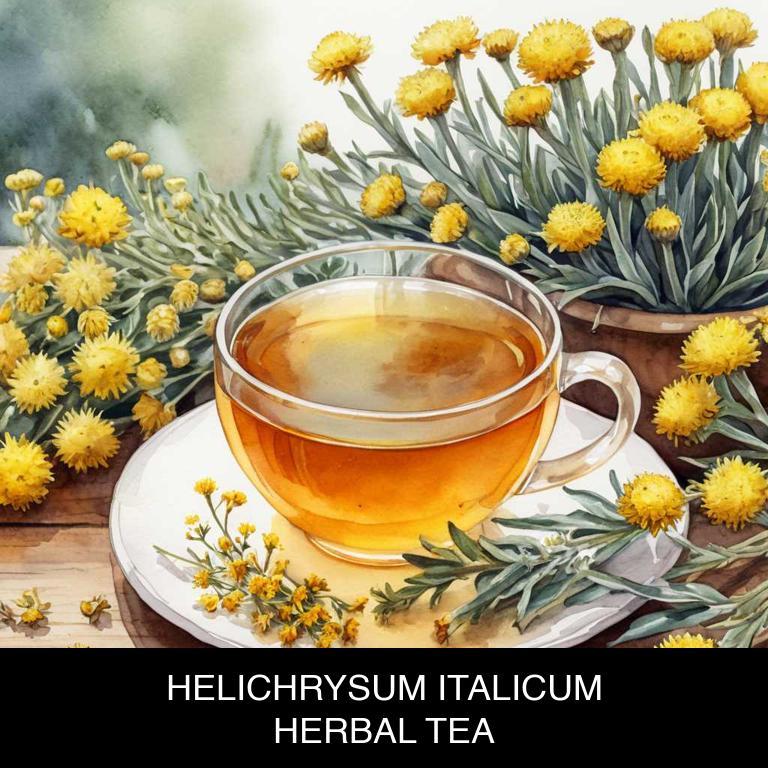
Medicinal Constituents
The list below shows the primary medicinal constituents in Helichrysum italicum teas that help with peptic ulcers.
- Alkaloids: Alkaloids present in Helichrysum italicum tea may help alleviate peptic ulcers by reducing inflammation and preventing the formation of gastric ulcers due to their antioxidant and anti-inflammatory properties.
- Flavonoids: Flavonoids in Helichrysum italicum tea may help protect against peptic ulcers by scavenging free radicals, reducing oxidative stress, and inhibiting the production of pro-inflammatory enzymes that contribute to ulcer development.
- Terpenoids: Terpenoids in Helichrysum italicum tea may help prevent peptic ulcers by reducing inflammation, inhibiting the growth of Helicobacter pylori bacteria, and modulating the gut microbiome to promote a healthy balance of beneficial bacteria.
Parts Used
The list below shows the primary parts of curry plant used to make teas for peptic ulcers.
- Leaves: They are used to make teas due to their anti-inflammatory properties that help soothe and protect the stomach lining.
- Flowers: They are used to make teas due to their anti-inflammatory and antioxidant properties that help reduce inflammation and promote healing in the stomach.
- Barks: They are used to make teas due to their ability to stimulate digestive enzymes and aid in the healing process of stomach ulcers.
Quick Recipe
The following recipe gives a procedure to make a basic curry plant for peptic ulcers.
- Harvest 1/4 cup of dried helichrysum italicum flowers and leaves from a clean environment.
- Rinse the dried helichrysum italicum flowers and leaves with cold water for 30 seconds.
- Steep 1 teaspoon of dried helichrysum italicum flowers and leaves in boiling water for 5 minutes.
- Strain the tea through a fine-mesh sieve into a cup or teapot.
- Allow the tea to cool for 10 minutes before consumption.
5. Hypericum perforatum
Hypericum perforatum, also known as St. John's Wort, teas helps with peptic ulcers because of its anti-inflammatory and antioxidant properties.
The tea contains hyperforin, a compound that reduces inflammation in the stomach lining, helping to heal peptic ulcers. The antioxidant properties of the tea also protect the stomach lining from damage caused by free radicals, promoting a faster recovery.
The anti-inflammatory effects of the tea can also help reduce stomach acid production, further aiding in the healing process of peptic ulcers.

Medicinal Constituents
The list below shows the primary medicinal constituents in Hypericum perforatum teas that help with peptic ulcers.
- Hyperforin: Hyperforin exhibits anti-inflammatory and antioxidant properties, which can help reduce inflammation and alleviate symptoms associated with peptic ulcers.
- Naphthodianthrones: Naphthodianthrones in Hypericum perforatum teas have been shown to possess antioxidant and anti-inflammatory activities, which can aid in protecting the mucous membrane of the stomach and reducing oxidative stress caused by peptic ulcers.
- Quercetin: Quercetin, a flavonoid present in Hypericum perforatum teas, has been found to possess anti-inflammatory and antioxidant properties, which can help in reducing inflammation and promoting the healing of peptic ulcers.
Parts Used
The list below shows the primary parts of st john's wort used to make teas for peptic ulcers.
- Leaves: They contain flavonoids and tannins, which have anti-inflammatory and astringent properties that can help soothe and protect the mucous membranes in the digestive tract.
- Flowers: They are rich in flavonoids, particularly quercetin, which has anti-inflammatory and antioxidant properties that can help reduce inflammation and promote healing in the digestive tract.
- Stems: They contain flavonoids and tannins, similar to the leaves, which can help reduce inflammation and protect the mucous membranes in the digestive tract.
Quick Recipe
The following recipe gives a procedure to make a basic st john's wort for peptic ulcers.
- Gather 25-30 grams of dried hypericum perforatum flowers and leaves for the tea.
- Steep 5-7 grams of the dried herb in 250 milliliters of boiling water for 5-10 minutes.
- Strain the tea mixture through a cheesecloth or a fine-mesh sieve into a cup.
- Discard the solids and add honey or other sweetener to taste if desired.
- Allow the tea to cool to room temperature before consuming it immediately.
6. Althaea officinalis
Althaea officinalis, also known as marshmallow, teas helps with peptic ulcers because of its anti-inflammatory and soothing properties.
The mucilages present in the plant create a protective barrier on the stomach lining, reducing inflammation and discomfort. This helps to accelerate the healing process of peptic ulcers by shielding the damaged area from further irritation.
Additionally, the tea's calming effects can help alleviate stress-related stomach issues, promoting a healthier digestive system and overall well-being.
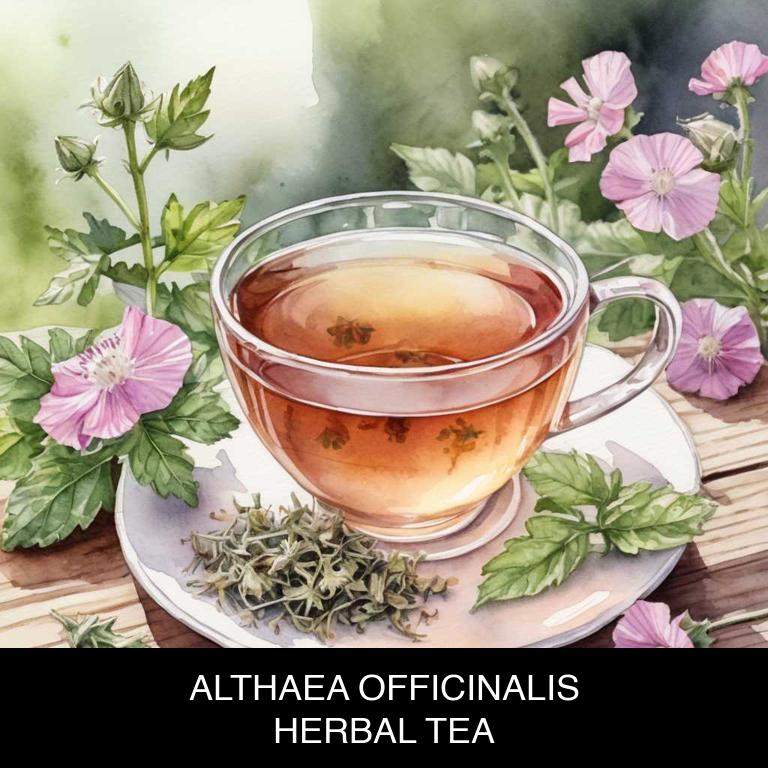
Medicinal Constituents
The list below shows the primary medicinal constituents in Althaea officinalis teas that help with peptic ulcers.
- Mucilages: Mucilages help protect the stomach lining by creating a physical barrier that soothes and shields it from acid, thereby reducing inflammation and promoting healing.
- Polysaccharides: Polysaccharides, particularly pectin, help to reduce inflammation by inhibiting the production of pro-inflammatory enzymes and mediators, thus alleviating symptoms of peptic ulcers.
- Flavonoids: Flavonoids, such as quercetin, exhibit anti-inflammatory and antioxidant properties, which help reduce inflammation, prevent oxidative stress, and promote the healing of peptic ulcers.
Parts Used
The list below shows the primary parts of marshmallow used to make teas for peptic ulcers.
- Roots: They are rich in mucilage, a soothing substance that helps protect and heal the stomach lining.
- Leaves: They contain mucilage and other compounds that have anti-inflammatory and soothing properties, aiding in the treatment of peptic ulcers.
- Stems: They also contain mucilage, which helps to protect and heal the stomach lining, reducing inflammation and discomfort associated with peptic ulcers.
Quick Recipe
The following recipe gives a procedure to make a basic marshmallow for peptic ulcers.
- Harvest 1-2 ounces of dried althaea officinalis root or leaf for making herbal tea.
- Rinse the althaea officinalis with cold water to remove impurities and excess particles.
- Steep 1 teaspoon of dried althaea officinalis in 8 ounces of boiling water for 5-10 minutes.
- Strain the tea mixture through a fine-mesh sieve to remove solids and excess particles.
- Drink the herbal althaea officinalis tea immediately or store it in the refrigerator for up to 24 hours.
7. Taraxacum officinale
Taraxacum officinale, also known as dandelion, teas helps with peptic ulcers because of its anti-inflammatory and protective properties on the mucous membranes of the stomach and small intestine.
The tea's high content of antioxidants and flavonoids, particularly taraxasterol, helps to soothe and heal the ulcerated tissue, reducing inflammation and promoting the growth of new, healthy tissue.
Additionally, dandelion tea may help to stimulate digestive enzymes and improve gut motility, further aiding in the recovery from peptic ulcers.

Medicinal Constituents
The list below shows the primary medicinal constituents in Taraxacum officinale teas that help with peptic ulcers.
- Apigenin: This flavonoid helps with peptic ulcers by exhibiting anti-inflammatory properties that reduce inflammation and alleviate pain in the digestive tract.
- Taraxasterol: This triterpene has been shown to possess anti-ulcerative properties, which help to protect the stomach lining and prevent further damage from acid secretion.
- Quercetin: This flavonoid has potent antioxidant and anti-inflammatory effects that aid in reducing inflammation and promoting the healing of peptic ulcers by protecting the stomach lining from oxidative stress.
Parts Used
The list below shows the primary parts of dandelion used to make teas for peptic ulcers.
- Leaves: Taraxacum officinale leaves are used to make teas for peptic ulcers because they contain anti-inflammatory and soothing properties that help in healing the mucous membranes in the stomach.
- Roots: Taraxacum officinale roots are used to make teas for peptic ulcers because they have anti-inflammatory and antibacterial properties that aid in reducing inflammation and promoting healing in the stomach lining.
- Flowers: Taraxacum officinale flowers are used to make teas for peptic ulcers because they contain compounds that help in reducing inflammation and promoting the growth of new mucous membranes in the stomach.
Quick Recipe
The following recipe gives a procedure to make a basic dandelion for peptic ulcers.
- Harvest fresh taraxacum officinale leaves and flowers on a sunny day when they are at their peak potency.
- Clean the harvested taraxacum officinale leaves and flowers thoroughly to remove any dirt or debris.
- Steep 2-3 grams of dried taraxacum officinale leaves and flowers in 1 liter of boiling water for 5-7 minutes.
- Strain the taraxacum officinale tea mixture through a fine-mesh sieve into a large bowl to remove solids.
- Store the taraxacum officinale tea in the refrigerator to preserve its medicinal properties for up to 3 days.
8. Symphytum officinale
Symphytum officinale, also known as comfrey, teas helps with peptic ulcers because of its anti-inflammatory and mucilaginous properties.
The plant's root and leaf extracts have been traditionally used to soothe and protect the mucous membranes in the stomach and intestines, reducing inflammation and promoting the growth of new tissue. The tea's ability to stimulate the production of mucus also helps to protect the stomach lining from acid damage, providing relief from peptic ulcers and promoting healing.
This natural remedy has been used for centuries to support digestive health.
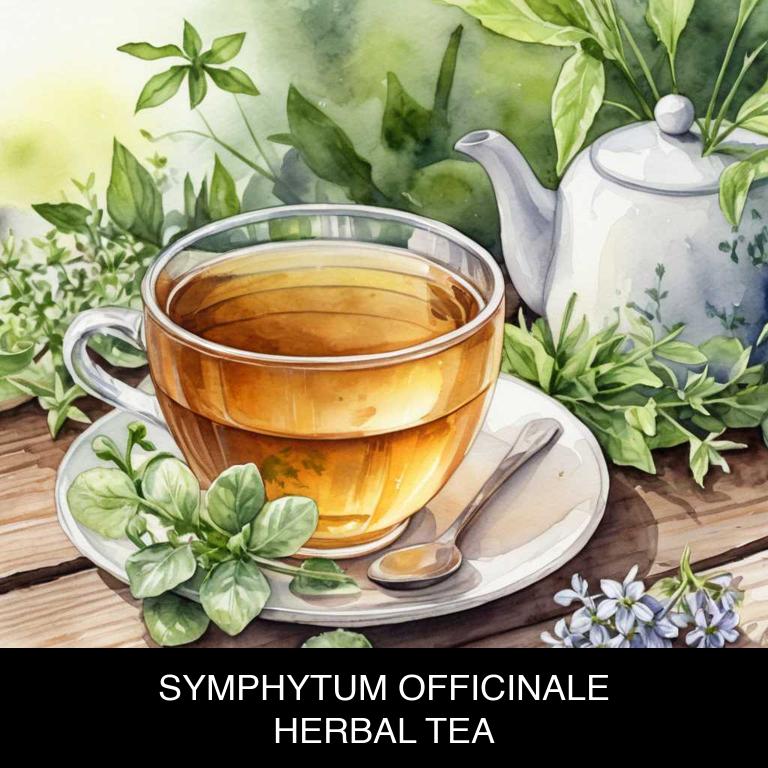
Medicinal Constituents
The list below shows the primary medicinal constituents in Symphytum officinale teas that help with peptic ulcers.
- Alkaloids: These compounds help protect the stomach lining and reduce inflammation, thereby alleviating pain and discomfort associated with peptic ulcers.
- Flavonoids: These phenolic compounds exhibit antioxidant and anti-inflammatory properties, which help reduce oxidative stress and inflammation in the stomach lining, promoting healing and reducing the risk of peptic ulcer recurrence.
- Saponins: Saponins in Symphytum officinale have been shown to have anti-inflammatory and protective effects on the gastrointestinal tract, potentially reducing the severity and frequency of peptic ulcers by shielding the stomach lining from acid damage.
Parts Used
The list below shows the primary parts of comfrey used to make teas for peptic ulcers.
- Leaves: They are rich in mucilage, a soothing compound that helps to protect and heal the mucous membranes in the stomach and intestines.
- Roots: The roots contain anti-inflammatory compounds that reduce inflammation and promote healing in the digestive tract.
Quick Recipe
The following recipe gives a procedure to make a basic comfrey for peptic ulcers.
- Harvest fresh leaves of symphytum officinale in the early morning when they are still moist with dew.
- Dry the harvested leaves in a warm and dry place for at least 24 hours to reduce moisture content.
- Measure out 1-2 teaspoons of dried symphytum officinale leaves for every 8 ounces of boiling water.
- Steep the dried leaves in boiling water for 5-7 minutes to release their active compounds and flavor.
- Strain the tea through a fine-mesh sieve or cheesecloth to remove the solid particles before serving.
9. Plantago major
Plantago major, also known as plantain, teas helps with peptic ulcers because of its anti-inflammatory properties.
The leaves of the plant contain mucilages that form a protective barrier on the stomach lining, reducing inflammation and pain. Plantain tea has also been found to have antioxidant properties, which help to neutralize free radicals that can damage the stomach lining.
Additionally, plantain tea has been shown to have antimicrobial properties, helping to prevent bacterial overgrowth and infection that can contribute to peptic ulcers.
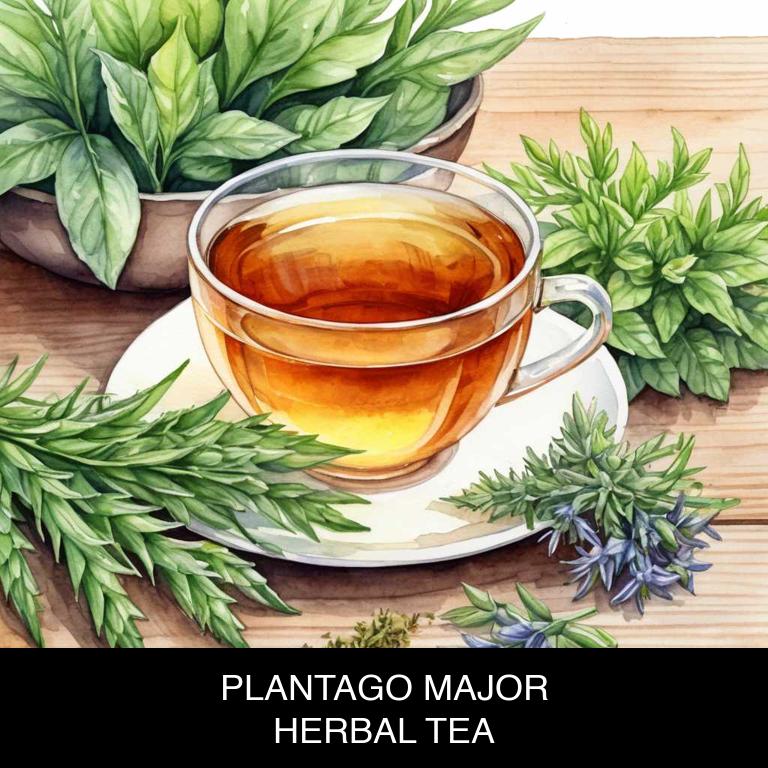
Medicinal Constituents
The list below shows the primary medicinal constituents in Plantago major teas that help with peptic ulcers.
- Triterpenoids: These compounds, particularly ursolic acid and oleanolic acid, have been shown to possess anti-inflammatory and protective effects on the gastric mucosa, which can help alleviate peptic ulcer symptoms.
- Phenolic acids: These compounds exhibit antioxidant and anti-inflammatory properties, which can help reduce oxidative stress and inflammation in the stomach, thereby promoting healing of peptic ulcers.
- Flavonoids: These compounds have been found to possess anti-inflammatory and gastroprotective effects, which can help reduce inflammation and promote healing of the gastric mucosa, ultimately alleviating peptic ulcer symptoms.
Parts Used
The list below shows the primary parts of plantain used to make teas for peptic ulcers.
- Leaves: The leaves of Plantago major are used to make teas for peptic ulcers due to their high mucilaginous content, which helps soothe and protect the stomach lining.
- Seeds: The seeds of Plantago major are used to make teas for peptic ulcers due to their anti-inflammatory properties, which help reduce inflammation and promote healing in the stomach and intestines.
- Stems: The stems of Plantago major are used to make teas for peptic ulcers due to their mucilaginous properties, which help form a protective barrier on the stomach lining and reduce irritation.
Quick Recipe
The following recipe gives a procedure to make a basic plantain for peptic ulcers.
- Gather 2 to 3 tablespoons of dried plantago major leaves which can be found in herbal stores or grown locally.
- Steep the dried leaves in 1 cup of boiling water for 5 to 7 minutes to release the active compounds.
- Strain the tea through a fine mesh or cheesecloth to remove any remaining plant material and sediment.
- Add honey to taste if desired to sweeten the tea and enhance its flavor profile.
- Drink the tea immediately or store it in the refrigerator for up to 24 hours before consumption.
10. Foeniculum vulgare
Foeniculum vulgare, also known as fennel, teas helps with peptic ulcers because of its anti-inflammatory and antispasmodic properties.
The tea's active compounds, including anethole and fenchone, have been shown to soothe the digestive tract and reduce inflammation in the stomach and small intestine. This can help to heal and protect the mucous lining of the stomach, reducing the risk of ulcers and promoting a healthy digestive environment.
As a result, fennel tea may be beneficial in managing peptic ulcers and promoting overall digestive well-being.

Medicinal Constituents
The list below shows the primary medicinal constituents in Foeniculum vulgare teas that help with peptic ulcers.
- Fenchone: Fenchone is a terpene that helps with peptic ulcers by reducing inflammation and inhibiting the growth of Helicobacter pylori, a bacteria that can cause ulcers.
- Anethole: Anethone helps with peptic ulcres by providing an antispasmodic effect, which can reduce stomach pain and cramps associated with ulcers.
- Ferulic acid: Ferulic acid is a phenolic compound that helps with peptic ulcers by reducing oxidative stress and inflammation in the stomach lining, thereby promoting healing and protection.
Parts Used
The list below shows the primary parts of fennel used to make teas for peptic ulcers.
- Seeds: Rich in antioxidants and essential oils, including anethole, which has anti-inflammatory and soothing properties.
- Leaves: Contain compounds that help reduce inflammation and ease digestive issues, making them suitable for soothing peptic ulcers.
- Roots: Have been traditionally used to treat digestive issues, including peptic ulcers, due to their carminative and anti-inflammatory properties.
Quick Recipe
The following recipe gives a procedure to make a basic fennel for peptic ulcers.
- Harvest 2-3 sprigs of fresh foeniculum vulgare leaves and stems for a 1-cup serving.
- Chop the harvested foeniculum vulgare into small pieces and measure 1 teaspoon of dried leaves.
- Steep the chopped foeniculum vulgare in 8 oz of boiling water for 5-7 minutes.
- Strain the tea with a fine-mesh sieve into a cup to remove the solids.
- Allow the tea to cool for 2-3 minutes before serving and consuming immediately.
What is the best combination of herbal teas to use for peptic ulcers?
The best combination of herbal teas that help with peptic ulcers is a blend of slippery elm, licorice root, and chamomile.
Slippery elm soothes the mucous membranes in the stomach, while licorice root reduces inflammation and alleviates pain. Chamomile calms the digestive system and promotes relaxation, which can help alleviate symptoms.
This combination can be consumed as a single tea or in separate infusions throughout the day.
What ailments similar to peptic ulcers are treated with herbal teas?
Ailments similar to peptic ulcers that are treated with herbal teas are gastritis, esophagitis, and inflammatory bowel disease.
Herbs such as marshmallow root, licorice root, and slippery elm help soothe and protect the mucous membranes in the digestive tract, reducing inflammation and discomfort.
Other herbs like aloe vera, chamomile, and peppermint can also provide relief from heartburn, bloating, and cramps associated with these conditions.